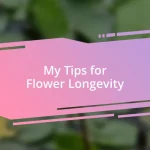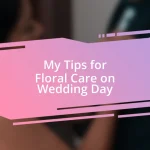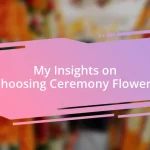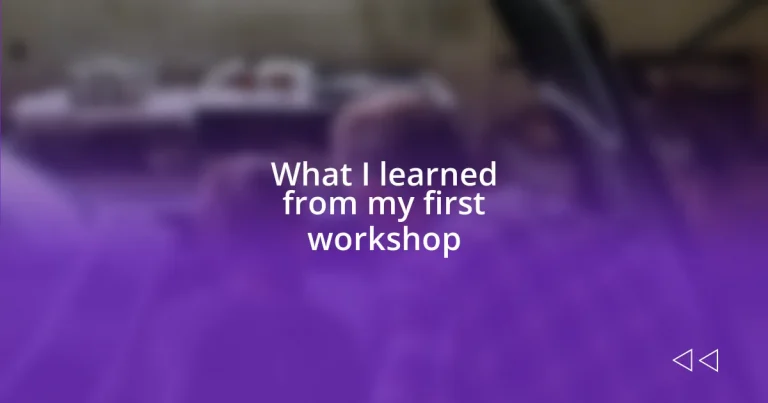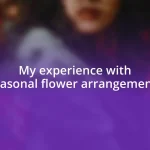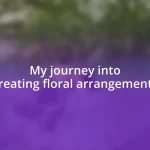Key takeaways:
- Preparation is key: Create an agenda, research speakers, and connect with peers beforehand to enhance the workshop experience.
- Active participation enriches learning: Engage in discussions, share ideas, and seek immediate application of new skills.
- Networking fosters relationships: Approach conversations with curiosity, use breaks for engagement, and follow up to maintain connections.
- Embrace challenges: Overcome initial discomfort, simplify information, and adapt to changes for a rewarding workshop experience.
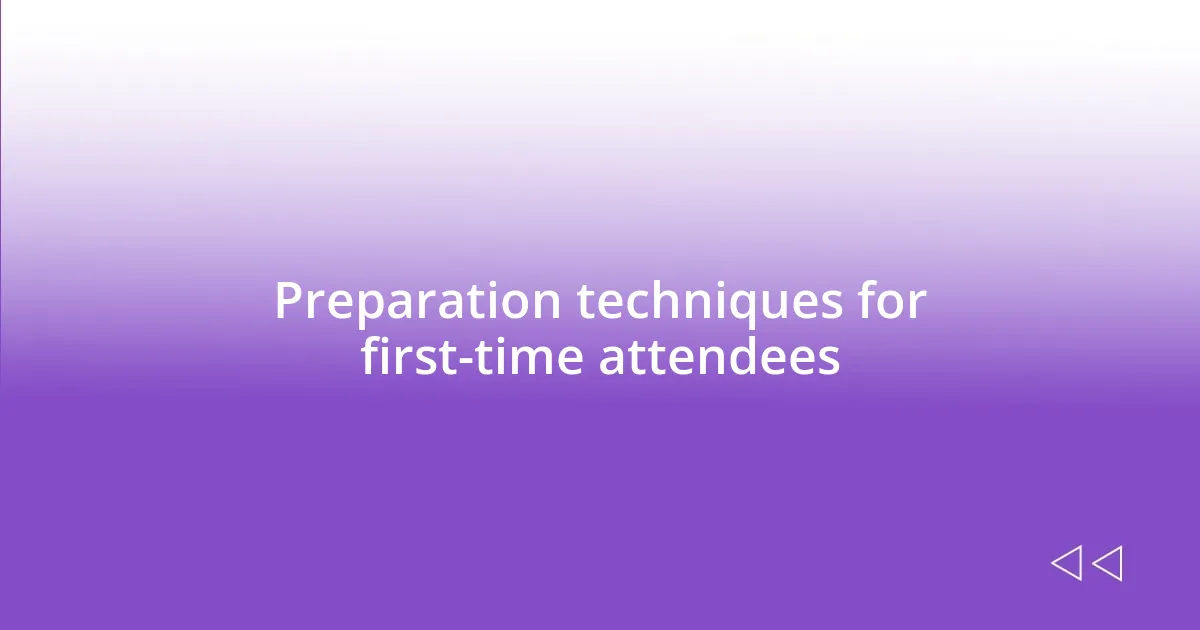
Preparation techniques for first-time attendees
As a first-time attendee, I remember feeling a mix of excitement and anxiety. One technique that helped me was creating a detailed agenda of the workshop sessions I wanted to attend. I wrote down my goals for the event, such as the skills I wanted to improve or the people I hoped to meet. Have you ever experienced that overwhelming sense of possibility but not known where to focus? Pinpointing my objectives gave me clarity and direction.
Another valuable preparation technique is to research the speakers and topics beforehand. I found that familiarizing myself with their backgrounds and areas of expertise allowed me to ask more insightful questions. There’s something uniquely empowering about walking into a room and feeling well-informed. Don’t you want to make the most of every interaction? Knowing who was presenting helped me engage in more meaningful conversations.
Lastly, I highly recommend connecting with fellow attendees before the event. I reached out through social media and ended up forming a small group to attend the workshop together. This not only eased my nerves but also created a support network throughout the experience. Have you ever met someone unexpected who transformed your event? Building connections in advance can truly enhance your overall experience and enjoyment.
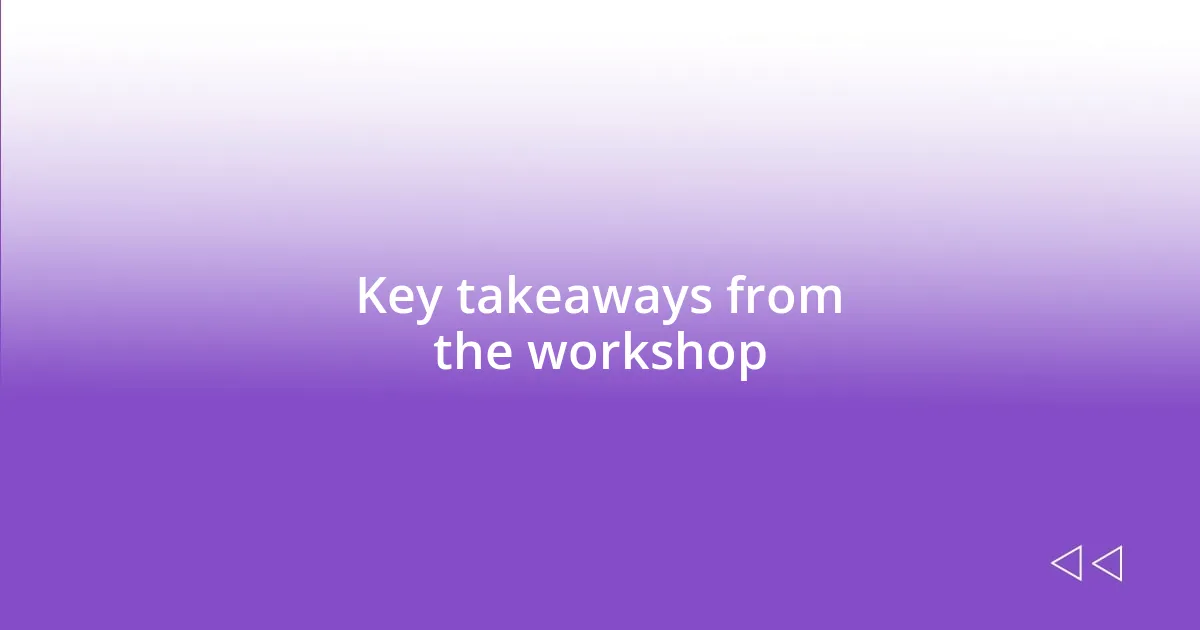
Key takeaways from the workshop
The workshop opened my eyes to the importance of active participation. I realized that simply sitting back and absorbing information isn’t enough. Engaging with the material and asking questions not only deepens understanding but also enhances retention. For instance, during a brainstorming session, I threw out an idea that led to an enlightening discussion with others, providing perspectives I hadn’t considered before. It felt incredible to contribute to a collaborative environment, which added richness to my learning experience.
Key takeaways from the workshop include:
- The power of networking: Establishing connections with participants can lead to long-lasting relationships.
- Embracing vulnerability: Sharing ideas—even those that seem incomplete—can spark valuable conversations and insights.
- Applying learning immediately: I discovered the effectiveness of putting new skills into practice right away, reinforcing what I learned through hands-on experience.
- Being open to feedback: Actively seeking input from others helped me refine my understanding and approach to various topics discussed.
- Staying curious: Maintaining an inquisitive mindset throughout the workshop led to unexpected discoveries and learning opportunities.
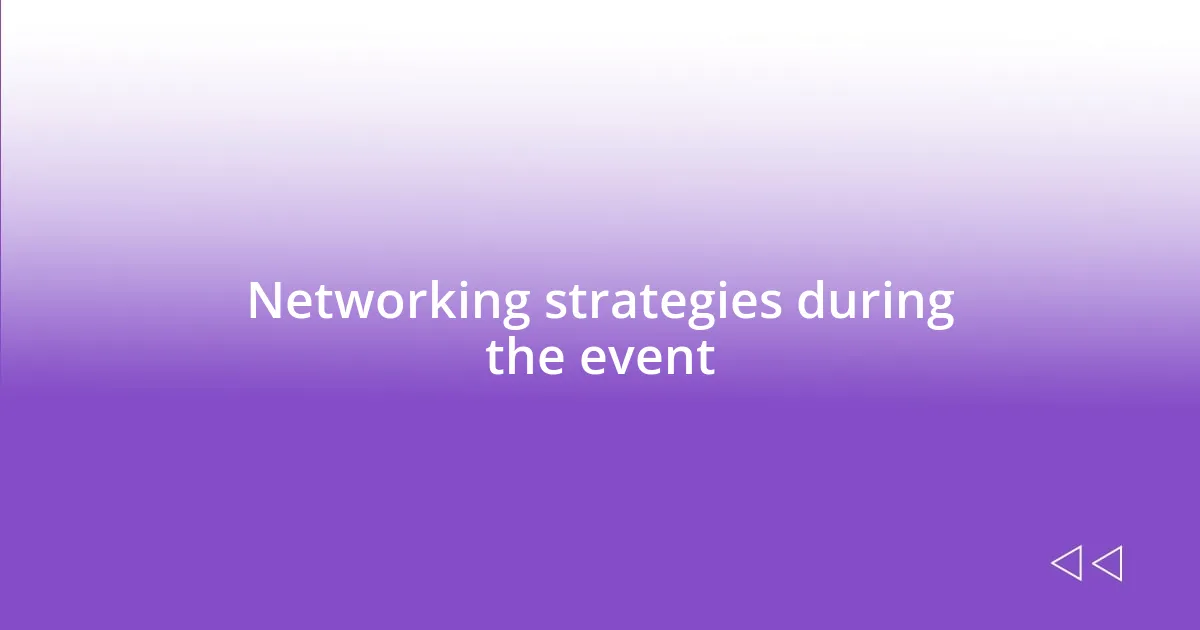
Networking strategies during the event
Networking at a workshop can be both exhilarating and intimidating. I found that approaching people with genuine curiosity made all the difference. Instead of thinking of it as ‘networking,’ I viewed it as connecting. I would often start conversations by complimenting someone’s presentation. This simple strategy not only eased my nerves but also opened doors to deeper discussions. What if I had just walked past them instead?
A game-changing strategy was utilizing informal breaks to engage in conversations. During snack time, I made it a point to sit next to someone new. We exchanged thoughts about the sessions we’d just attended, which naturally led to sharing our professional journeys. This shared experience brought a sense of camaraderie, reminding me that others were equally eager to connect. Have you ever noticed how spontaneous interactions often yield the best conversations?
Perhaps the most rewarding strategy I adopted was following up after the event. I sent personalized messages to the people I met on LinkedIn, mentioning something memorable we discussed. This simple act solidified connections and often blossomed into collaborations later on. It’s remarkable how these small gestures can create lasting relationships. What’s the most significant connection you’ve built at an event?
| Networking Strategies | Description |
|---|---|
| Genuine Curiosity | Approach others with interest in their experiences and insights. |
| Informal Break Engagement | Use breaks to strike up conversations and share professional journeys. |
| Personalized Follow-up | Send tailored messages to reinforce connections made during the event. |
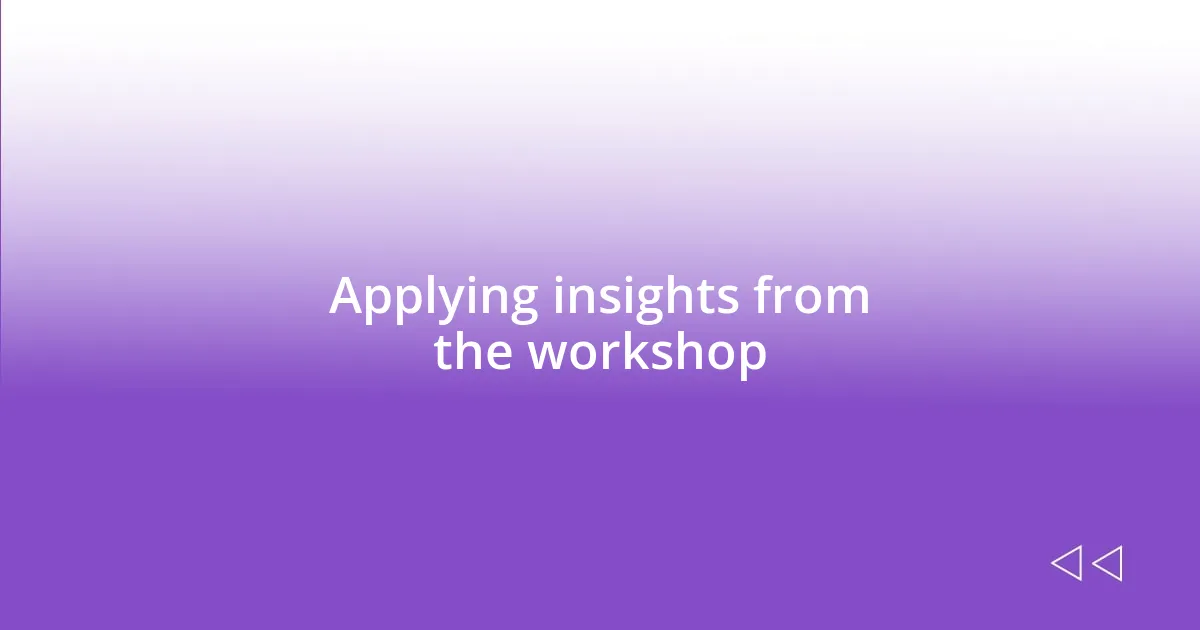
Applying insights from the workshop
Applying insights from the workshop helped me see the immediate benefits of hands-on practice. After the sessions, I decided to implement one new technique I learned during a small project at work. The excitement I felt when I noticed a tangible improvement in my workflow was remarkable. Have you ever had that moment when you realize a new approach actually makes a difference?
I also took the time to seek feedback from colleagues about my performance, which was directly influenced by what I absorbed at the workshop. Initially, it felt a bit daunting to ask for critiques, but the responses were overwhelmingly positive. Their insights not only boosted my confidence but also provided me with fresh perspectives I hadn’t considered before. Isn’t it interesting how others can help us see ourselves more clearly?
Embracing vulnerability played a crucial role as I shared my workshop experiences with my team. I opened up about my struggles and the incomplete ideas that emerged during discussions. The response was heartening; many teammates connected with my journey and shared their own experiences. This exchange created a deeper bond between us and fostered a culture of collaboration. How often do we underestimate the power of honesty in building relationships?
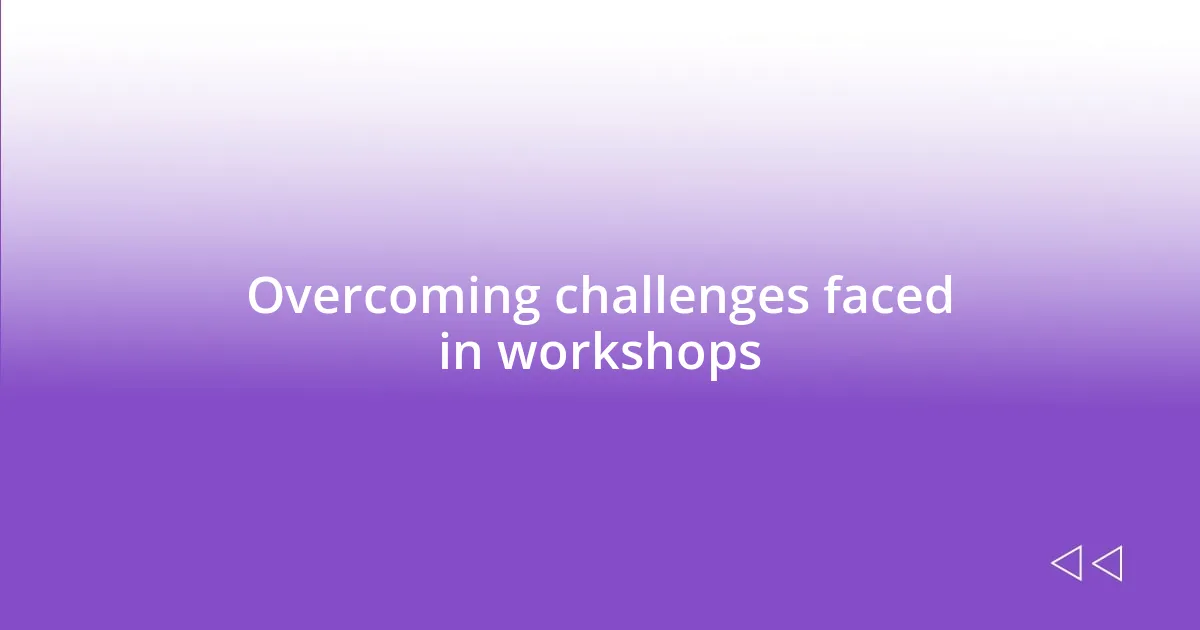
Overcoming challenges faced in workshops
Overcoming challenges in workshops is often about managing those initial feelings of discomfort. I vividly remember the first time I struggled to contribute during a group discussion. My heart raced, and I questioned whether my thoughts were valuable. Yet, I took a deep breath and shared my perspective. Surprisingly, I discovered that my insights resonated with others, creating a sense of belonging I hadn’t anticipated. Have you ever hesitated to speak up, only to find that your voice matters?
Another major challenge I faced was the overwhelming amount of information presented. With so many ideas and techniques flying around, it felt impossible to absorb everything. To tackle this, I made it a point to jot down key takeaways during sessions. This act of writing not only reinforced my understanding but also helped me engage actively. I realized that breaking down complex topics into digestible pieces made the learning curve so much easier. Does simplifying difficult concepts help you, too?
Lastly, adapting to the dynamic environment of workshops can be tricky. I recall a session where the format shifted unexpectedly, leaving me momentarily thrown off balance. Instead of resisting the change, I leaned into it, allowing myself to adapt and embrace the spontaneity. This mindset transformed what could have been a frustrating experience into an opportunity for genuine learning. Have you experienced a situation where flexibility opened new doors for you?
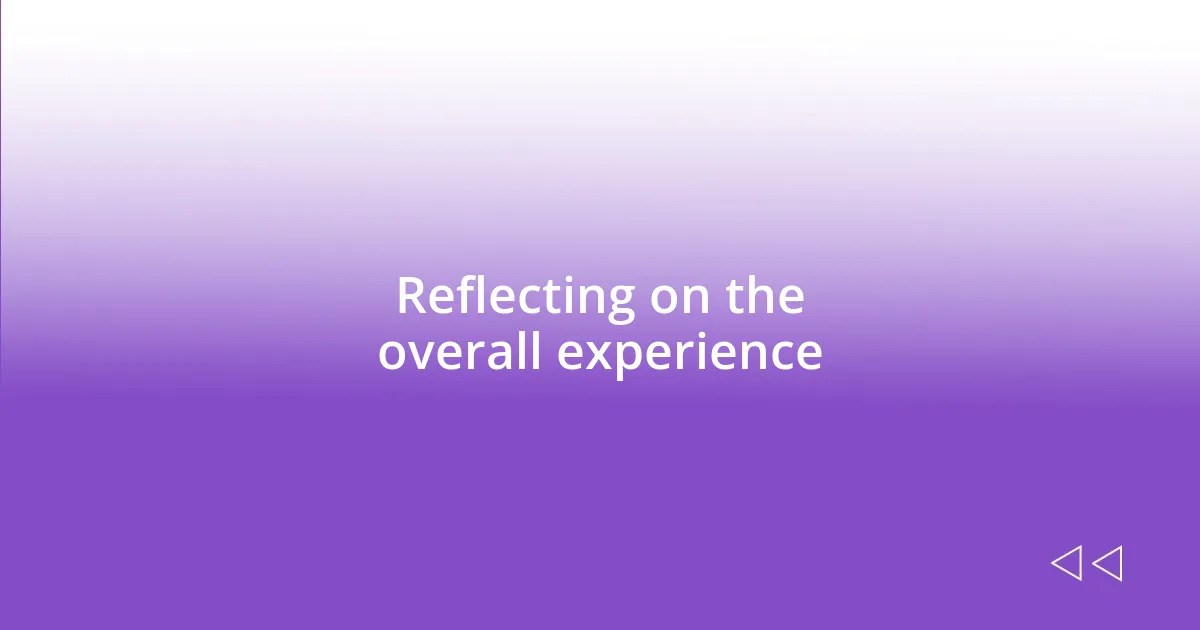
Reflecting on the overall experience
Reflecting on my overall experience from the workshop, I was struck by how transformative it ultimately felt. The moment I stepped into the room, I was met with a mix of excitement and nerves. I quickly realized that everyone else was equally eager to learn, which fostered an atmosphere of openness. It’s interesting how that shared vulnerability can instantly make a group feel like a community, isn’t it?
As the workshop days progressed, I began to notice a shift in my confidence. Each time I shared a thought during discussions, I felt a sense of empowerment wash over me. I remember one specific instance where a fellow participant responded to my idea with genuine enthusiasm, and it sparked a lively conversation. That experience made me appreciate the collaborative nature of learning. Have you ever felt that exhilarating rush when your ideas are met with appreciation?
Looking back, I see those few days as a significant turning point in my professional journey. It wasn’t just about the skills I acquired; it was also about the relationships I built and the perspectives I gained. I’ve come to value the importance of surrounding myself with diverse thinkers. It’s fascinating how a single experience can broaden our understanding and inspire growth. Do you recall a moment in your own journey that reshaped the way you think?




